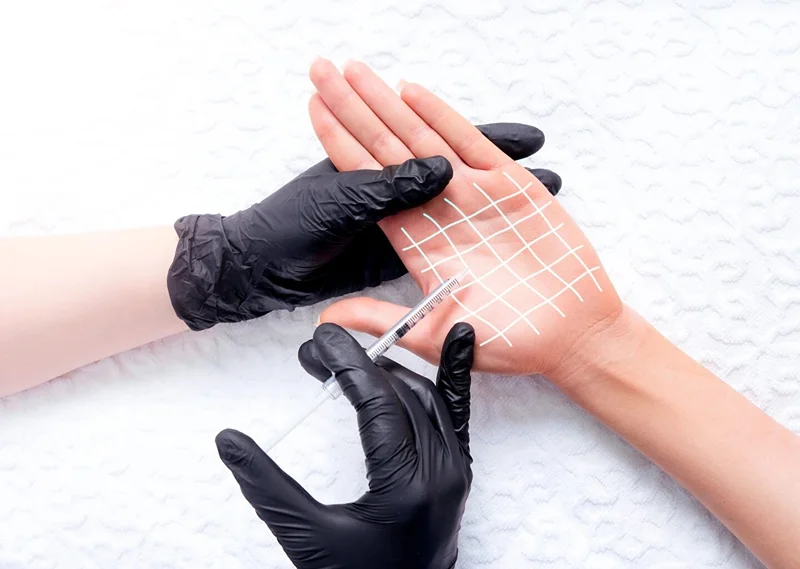Understanding Excessive Sweating: Dermatology Insights on How to Stop Sweaty Hands
Understanding Excessive Sweating: Dermatology Insights on How to Stop Sweaty Hands
Blog Article
Comprehending the Source of Excessive Sweating and Its Effect On Day-to-day Live
While it is generally comprehended as a physiological response to manage body temperature level, the triggers for extreme sweating can vary extensively amongst individuals, encompassing not just physical aspects but psychological and additionally emotional elements. By diving into the origin triggers of hyperhidrosis and exploring its complex impacts, a much deeper understanding of this prevalent issue can be obtained, dropping light on the intricacies that people grappling with excessive sweating browse on a daily basis.
Physiology of Sweat Glands
The law of sweat production, an important physiological procedure, is primarily regulated by the activity of gland distributed throughout the human body. Gland are classified into 2 primary kinds: eccrine and apocrine glands. Eccrine glands are the most many and are found in mostly all areas of the body. They play a crucial role in thermoregulation by secreting a watery liquid onto the skin's surface, which helps and vaporizes cool down the body down. In contrast, apocrine glands are focused in locations rich in hair roots, such as the underarms and groin, and their secretions are thicker and milky in look.
When the body temperature climbs, either due to physical activity, high temperature levels, or psychological stress, the nerves sets off the gland to generate sweat. This sweat is made up primarily of water and electrolytes like sodium and chloride. The procedure of sweat manufacturing is essential for maintaining the body's interior temperature level within a slim, optimal range, highlighting the critical duty sweat glands play in human physiology.
Triggers for Excessive Sweating
In understanding the origin causes of too much sweating, it is vital to determine the triggers that can lead to this physiological feedback. Physical effort, high temperature levels, and spicy foods are likewise known to cause extreme sweating in people susceptible to this condition.
Moreover, medications such as some antidepressants, opioids, and particular supplements can likewise act as triggers for hyperhidrosis. Comprehending these triggers is important in taking care of excessive sweating properly - Treatment for hyperhydrosis of hands and feet. By determining and addressing the certain triggers that prompt extreme sweating in a specific, health care providers can establish personalized treatment strategies to alleviate this condition and boost the individual's lifestyle
Medical Issue Associated
Associated with extreme sweating are numerous medical conditions that can aggravate this physiological reaction. One typical problem is hyperhidrosis, a disorder defined by unusually raised sweating that exceeds the body's thermoregulatory requirements. This can materialize in focal locations like the hands, soles, underarms, or face, impacting an individual's lifestyle as a result of social shame and discomfort.
Additionally, endocrine disorders such as hyperthyroidism, diabetes, and menopausal warm flashes can also lead to excessive sweating. Hyperthyroidism triggers an overflow of thyroid hormonal agents, speeding up metabolism and setting off sweating.
In addition, infections like hiv, tuberculosis, and endocarditis have been related to night sweats, a typical sign known to interfere with sleep and affect general wellness. These clinical conditions highlight the diverse array of underlying aspects that can add to excessive sweating, demanding detailed examination and management by health care professionals.
Emotional and psychological Elements

Effect On Social Communications
Extreme sweating can have profound effects on a person's capacity to engage easily in social communications. The visible indications of sweat discolorations or wet spots on clothing can cause shame and self-consciousness, causing people to withdraw from social circumstances. This withdrawal can influence connections, limitation social tasks, and hinder professional and personal growth.

Moreover, the anxiety and self-confidence problems coming from too much sweating can influence interaction and social abilities. People might struggle to concentrate on conversations, join group activities, or express themselves confidently. This can result in feelings of isolation and loneliness, as social connections become challenging to maintain.
Conclusion

While it is frequently comprehended as a physiological response to manage body temperature level, the triggers for extreme sweating can vary widely amongst people, incorporating not only physical elements but mental and also emotional components. go to this web-site By diving into the root creates of hyperhidrosis and discovering its complex impacts, a deeper understanding of this prevalent problem can be gained, losing light on the intricacies that individuals grappling with too much sweating navigate on a daily basis.
Physical exertion, high temperature levels, and spicy foods are likewise known to cause extreme sweating in individuals vulnerable to this problem. By determining and addressing the specific triggers that motivate extreme sweating in an individual, medical care suppliers can establish customized treatment strategies to minimize this condition and boost the individual's quality of life.
Extreme sweating can have profound impacts on a person's capability to involve conveniently in social communications.
Report this page